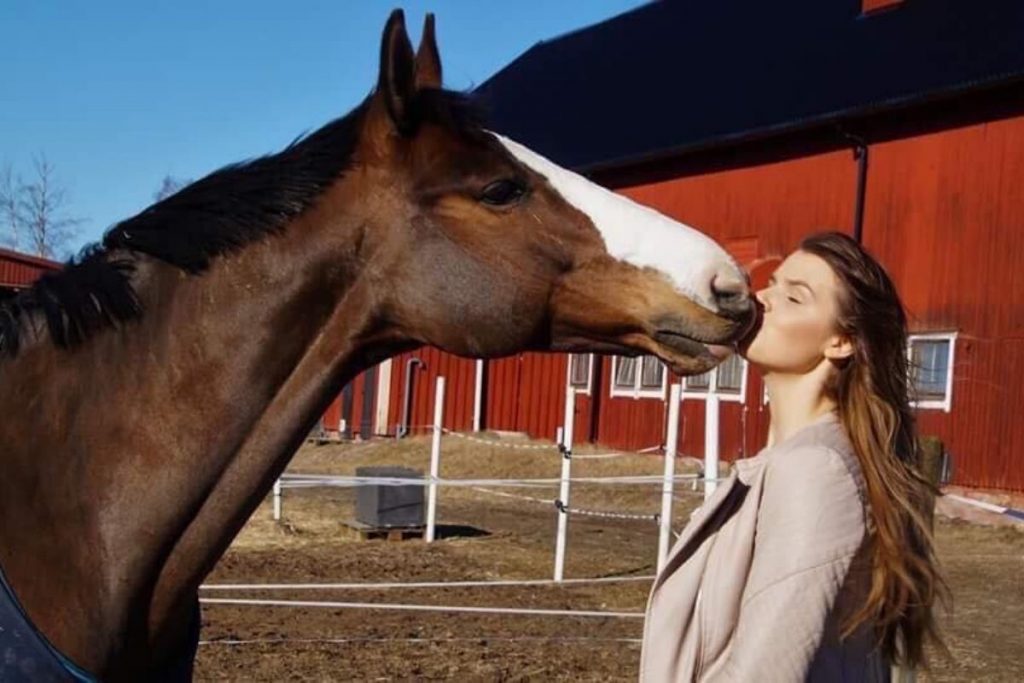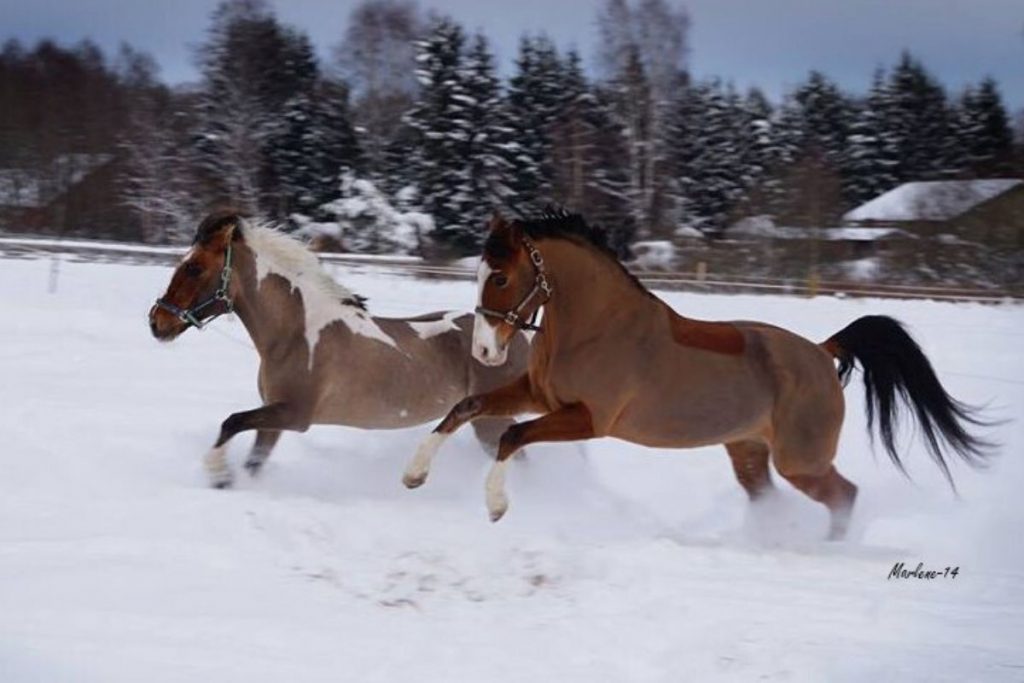When it comes to domesticated animals, few are as respected as horses. They are seen as a cowboy’s companion and a great work animal. Though they are respected, it’d be a lie to say they aren’t intimidating. Due to their size alone, a horse attack could be potentially lethal.
Do horses attack humans and other animals? Though it is rare to see in domesticated horses, there are cases where horses can attack people, other horses, as well as other species that they encounter. This can be caused by pathological dominance aggression or just being agitated.
In most cases, you shouldn’t have to worry about a horse randomly attacking you or your pets. Knowing when you should get concerned is a large portion of the battle.
Do Horses Attack Humans And Other Animals?
For the most part, domesticated horses do not attack humans and rarely attack other animals on purpose. In order for a typical horse to become aggressive enough to attack, the horse would have to have conditions that make it anxious, defensive, or agitated.
That being said, some horses also have a trait called pathological dominance aggression. This trait can cause them to lash out in order to establish themselves as the dominant animal in the area.

What Are The Most Common Causes Of Horse Aggression?
When a horse attacks, it’s rarely without reason. Horses need to be properly trained, cared for, and handled in order to maintain their calm. The most common causes for a horse attack include:
- Fear. If a horse is afraid of someone or is startled, they may kick or fight back as a defense mechanism.
- Tight Stalls. Horses become very agitated when they aren’t given enough space to move around.
- Sexual Aggression. Male horses may challenge other horses when they are feeling sexually aggressive or denied. Among mares, maternal aggression is relatively normal after having a foal.
- Low Resources. A horse that has limited food or water with many stall mates is a dangerous horse. Horses are prone to “resource hoarding,” which can quickly turn violent.
- Pathologic Dominance Aggression. If your horse acts aggressively towards other horses, this could be why.
- Pain. A horse that is in pain or has been struck too many times will lash out at the attacker.
The overall pattern here is that horses are prone to attacking people and other animals when they’re not happy or handled correctly.
What Is Pathologic Dominance Aggression?
Pathologic dominance aggression is a disorder that makes horses feel a need to be dominant towards owners and other horses at all times. This is often a trait that the horse is born with, or is caused by hormonal fluctuations.
This form of aggression can be treated with proper training and neutering. That being said, any horse that is diagnosed with PAD should be considered dangerous towards humans and other horses.

Why Would Horses Attack Humans?
Studies show that the majority of horse attacks that occur are directly or indirectly caused by humans. In many cases, a seemingly random attack is actually sparked as a result of exacerbating factors that make a horse anxious, defensive, or puts them in pain.
A horse that lashes out at its owner is often a horse that has been pushed to its physical or emotional limits. When it comes to attacks towards humans caused by humans, these reasons below are the most likely culprits:
- Poor Food, Water, and Shelter. If a horse is not given enough resources to remain comfortable, it will eventually lash out. This is one major reason why horses have to be given ample food, water, and space.
- Fear of the New. Due to the fact that horses are prey animals, any new people or movements can put a horse on an instinct-base defensive. Not taking time to introduce skittish horses to new people or places can cause aggression.
- Abuse. A horse that is in pain is a horse that will eventually fight back.
- Poor Socialization. Horses won’t know how to behave around people if they aren’t well trained or broken. Proper training is vital to keeping a horse safe to be around.
Why Would Horses Attack Other Horses?
When it comes to violence between horses, dominance, sexual aggression, and resource hoarding at the most common culprits. Any horse that displays abnormal aggression should be kept away from other horses until the reason is found and fixed.
Why Would Horses Attack Other Animals?
Horses are natural herbivores, and while they they can weigh thousands of pounds, they are still prey animals. This means that fighting and aggression towards other animals is usually sparked by fear of predation.
How Can You Tell If A Horse Will Attack You?
Horses rarely, if ever, attack without warning. If you are concerned about a horse’s demeanor, it’s best to look at their facial expressions and body language. Horses who are about to lash out or kick will often have:
- Ears slicked back. A calm horse will usually have its ears perked up. Horses that are angered or defensive will point their ears down.
- Aggressive stances. Does your horse look like it’s about to rear up or lower its front closer to the ground? This is a telltale sign that your horse is about to kick.
- Eyes focused on the object of aggression. If a horse is staring at you and moving its body to keep an eye on you, you may be in trouble.
- Flared nostrils. Much like bulls, horses will also flare their nostrils and snort when they are agitated.
- Mimed biting. Does your horse look like he’s chomping at something? This is a classic sign of aggression.
- Angling the back of his body towards you. This often suggests that he’ll start kicking.
Can Disease Cause A Horse To Attack?
Believe it or not, there are diseases that can cause aggression in horses. Any disease that affects the horse’s brain has the potential to cause aggression in an otherwise calm horse. Rabies, encephalomyelitis, brain tumors, Strep. Equii and even pesticide poisoning can spark a horse attack.
If your normally-calm horse recently became more aggressive, getting a vet involved is a wise decision.
How To Prevent Aggression In Horses
Aside from making sure they are well-fed, hormonally balanced, and given ample space; there are still a couple of things that trainers and owners can do in order to reduce aggression. These include:
- Kind but firm training right from the start. When foals are young, seeing them nip and buck might be cute. It won’t be so cute when they’re eight feet tall. Starting foal training young is crucial to reducing aggression.
- Rewarding good behavior. If you have a skittish horse that gets nervous around new people, helping them get more comfortable around people by positive reinforcement will work wonders.
- Keeping a soothing environment. Environment matters to horses, more than you think. A quiet, clean stall with extra space is a place for a happy horse.
- Regular interaction with people. Horses feel pain when they’re neglected, and they reflect the energy they receive. If they feel unwanted, neglected, or abused, they will become aggressive.
- Neutering stallions. Hormones often have a part to play in aggression, especially when it comes to males.
- Gradual introduction to other animals. If you want to keep your horse around other animals, gradual introductions are a must. Horses have a natural fear of anything new, so being careful with new introductions can help curb fear-based kicks immensely.
